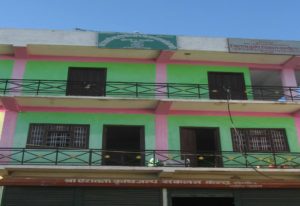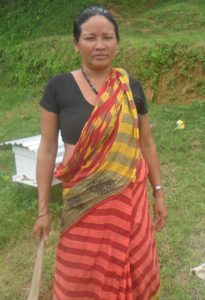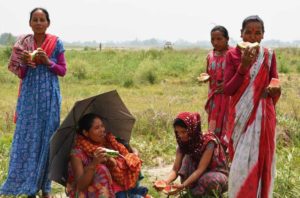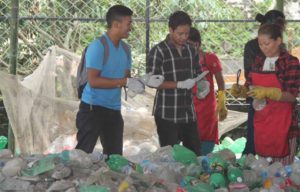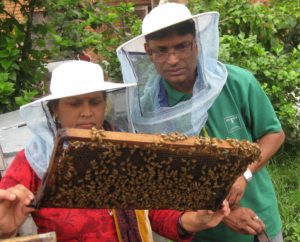STRIVING TOWARDS
GENDER EQUALITY & SOCIAL INCLUSION
INCLUDE stands for the Inclusive Development of
the Economy Programme in Nepal. It contributes
to a socially balanced economic growth, by reaching
out to poor and ultra-poor inhabitants, who are or
could be economically active, in particular women,
marginalized castes and ethnic/religious groups, conflict
affected people and people with disabilities.
Gender Equality and Social Inclusion always
go hand in hand!
In Nepal, the unequal power relations are not just
limited to men and women but also between different
castes and social groups.Therefore gender AND
social inclusion through economic development is
the core focus of all INCLUDE interventions.
GESI Guidelines
Gender Equality and Social Inclusion (GESI) is a
concept which addresses unequal power relations
between women and men and between different
social groups. It focuses on the need for action to
re-balance these power relations and ensures equal
rights, opportunities and respect for all individuals
regardless of their social identity.
INCLUDE has developed mainstreaming guidelines
to help steer all decision making processes both
internally as well as within its partner organisations.
Basically three main aspects are followed in all decisions
of the INCLUDE management:
Working in a post-conflict context, the dono-
harm principles, combined with pro-GESI
decisions are most important when selecting
partner organisations; therefore, GESI criteria
are followed when identifying and selecting new
partner organisations, in particular, cooperatives.
• Partner organisations are then guided towards a
strategic plan in which GESI finds full integration;
together with the partners, areas for GESI
interventions are identified and implemented.
• Strengthening the partner organisations to continuously
embrace and live the GESI concept by
building their capacity to mainstream GESI in
their governance, strategy, processes and services.
INCLUDE has developed partner selection criteria in
which GESI aspects form a major component:
• A GESI policy in place;
• The composition of the executive committee and the
members;
• GESI-friendly services to the members.
The most important GESI success factor in the
INCLUDE programme is its specific value chain approach.
The value chains of beekeeping, medicinal and
aromatic plants (MAPs), dairy and riverbed farming have
been chosen for their high inclusiveness relevance. An
independent Poverty Impact Assessment Study (November
2014) confirmed that these value chains are one of
the most accessible and profitable forms of employment
for women and disadvantaged groups in the remote area
of the programme districts.Till date, more than 7.500
disadvantaged people – including 3.080 women – earn
a sustainable income as producers in one of these selected
value chains.
A success story from the field: Airawati Multipurpose Cooperative
Private Limited
The Airawati Multipurpose Cooperative Private Limited (AMC) is a partner
cooperative of the INCLUDE programme in the Pyuthan district in Mid-
West Nepal. The cooperative is actively involved in the collection and sale
of Ginger, Turmeric, honey, MAPs, herbals and other agricultural products,
produced by its members. AMC also provides savings and credit facilities to
its members for micro enterprise development at the local level. The practice
of the cooperative in relation to GESI is highlighted below:
• Policy: The policy of the cooperative is focused on the empowerment of
women and disadvantaged groups both economically as well as socially.
• Composition of the Executive committee and the members: The cooperative
has 796 members in total, out of which, 48% (386) are women and
52% belong to ethnic minorities. The executive committee consists of 11
members out of which 2 are women and 7 belong to ethnic minorities.
• Incentives: The cooperative was successful to grab a subsidized loan
amounting to NPR 5.000.000 in 2013 and 2015 respectively, provided by
the Central Bank of Nepal as a reward for their inclusiveness in membership
and benefit sharing modality. The amount was used to mobilize the
community to create additional income and employment. Due to their
inclusive governance system, they were also able to capitalize the funds
from the Rural Micro Finance Development Centre amounting to NPR
4.800.000 to expand and uplift the businesses of their members.
• GESI Friendly activities: For the subsidized loan provided by the Central
Bank, AMC has given priority to women and the disadvantaged group.
Till date 42% of the loan has been provided to women and 11% to the
disadvantaged group. Moreover, in all activities implemented by the cooperative,
at least 40% of the participants (e.g. trainees) should be either
women or from disadvantaged groups.
A story of Yanuka Gharti Magar
Yakuna Gharti Magar is a resident of Pyuthan, a district in the Mid-Western
region of Nepal. She comes from a family where girls were not supposed to
be educated, but to carry out household chores. She got married at the young
age of 19. Her husband earned the family income through his employment
abroad. Soon after marriage, Yakuna became mother to three children and
stayed back with her in-laws to take care of their daily needs. Unfortunately
when she was just 34 years old, her husband died and all of a sudden the
financial burden was on her shoulders. She has no education, no access to
finance and basically nowhere to go.
Yanuka, however, joined the Airawati Multipurpose Cooperative. AMC
receives support from INCLUDE to develop service packages for its members,
e.g. in the field of honey production. Yanuka was introduced to beekeeping
activities and received a micro-credit to start with 3 hives. Yanuka participated
in a 7-day basic beekeeping training, a 7-day expert beekeeping training and
trainings on quality production, storage and processing. She also participated
in exposure visits to other beekeepers in the region. Now, through the sale of
her honey, Yanuka earns NPR 116.000 (EUR 1.000) and has become a successful
entrepreneur who is able to educate her children, look after her in-laws
and even take care of her nephew.
Some success stories of inclusive Business Models: Gender and Social Inclusion pays off!
Riverbed Farming
In the programme districts, vulnerable groups such as
landless and land–poor people are faced with high levels of
discrimination, poverty and food insecurity. INCLUDE
designed a special initiative, riverbed farming, that facilitates
access to farmland and agricultural inputs for those
disadvantaged people. Cooperatives mobilize the communities
along the Rapti river to identify their most disadvantaged,
landless and land-poor members. These people are
invited to become a group member of the cooperative and
to participate in farming activities along the vast banks and
beds of the Rapti river, once the river has pulled back after
the rainy season. These farmers receive training in good
agricultural practices and farming inputs such as seeds,
weighing machines, sprays, watering cans and crates. The
farmers have been so successful in their farming practices
that traders drive their trucks all the way to the riverbed
to load the fruits and vegetables and sell it to the local and
uphill markets. In the pre-monsoon season alone in 2015,
the income of more than 2.000 women and disadvantaged
people through riverbed farming is at least NPR 15.000
per person and may go up to NPR 438.000. Most important
though, the participants in riverbed farming state that
their status in their community has grown dramatically
and that this non-economic benefit is equally important to
their well being.
Hamri Bahini – The Green Angels
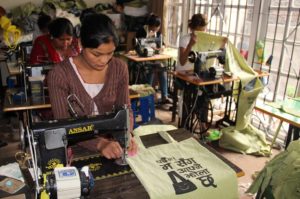 “Hamri Bahini” meaning “our little sisters”, is a social
“Hamri Bahini” meaning “our little sisters”, is a social
enterprise run by the Himalayan Climate Initiative
(HCI) and initiated with the technical support of
INCLUDE. While addressing Nepal’s environmental
problems, HCI works to create respectable green jobs
for disadvantaged young women of Nepal. The business
model is to replace plastic bags in urban areas of
Nepal with re-usable cotton shopping bags. The socalled
“green bags” are produced by young uneducated
women, some of whom are rehabilitated trafficked
women who have hardly any other chance to find respectable
jobs. An aggressive and successful anti-plasticbag
campaign by HCI led to plastic bags being banned
in Nepal, effective since 14th April 2015. The “Hamri
Bahini” is now a self–sustaining social enterprise.
Nagar Mitra – Friends of the City
Another HCI initiative, “Nagar Mitra – Friends of the City”,
improves the living conditions of the highly stigmatized waste
workers. In cooperation with Coca Cola, Bottlers Nepal,
Ganesha Ecosphere and INCLUDE, Nagar Mitra addresses
the most significant economic, social and environmental
PET waste problems through establishing a PET recollection
system in Kathmandu. Nagar Mitra pays better prices to
informal, especially female, waste workers for their PET bottles
and offers additional services such as health and hygiene
facilities, safety equipment and scholarship facilities for their
children. After just one year of its launch, Nagar Mitra already
works with 498 waste workers and directly employs 11
disadvantaged women for the sorting and bailing of the PET
bottles. Also here, the betterment of their position in society
is stated as more important than only the better income.
Conclusion
In Nepal, a gender focus alone would not find political
nor societal acceptance. Rather a broader promotion of
inclusiveness, taking into account all disadvantaged groups
of society (ethnic and religious minorities; people with
disabilities; women; conflict affected), the so called GESI
approach, is needed to mobilise partners and eventually
make a difference. INCLUDE tackles exactly this task.
“No other private sector development programme of the
German Development Cooperation than INCLUDE has
the inclusiveness agenda at the core of all its strategic
decisions; whether it is the choice of the value chains, the
choice of its partners and intermediaries or the concepts,
approaches and policies developed to promote economic
growth, all decisions are guided by their relevance to the
integration of disadvantaged people.”
– Evaluation mission INCLUDE, November 2015
INCLUDE is a joint Nepal-German initiative under the
guidance of the Nepal Ministry of Industry and with
Technical Assistance by the Deutsche Gesellschaft für
Internationale Zusammenarbeit (GIZ) GmbH, acting
on behalf of the German Federal Ministry for Economic
Cooperation and Development (BMZ).

 GIZ Gender Website
GIZ Gender Website